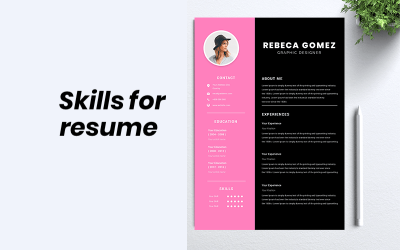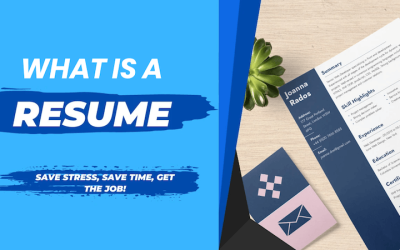Top Skills to Put on a Resume
Are you eligible for employment? According to recent statistics, 75% of HR experts acknowledge that there is a skills gap among applicants for available positions. But what exactly do they mean by “skills”?
Skills are your innate talents and the knowledge you gain to complete a task or hold a job. While professional skills enable you to carry out specific job duties, life skills help you manage daily chores in all aspects of your life. Soft skills, hard skills, domain-general skills, and domain-specific skills are some of the main categories of skills.
Your resume’s skills section demonstrates to potential employers that you possess the capabilities necessary to thrive in the position. Employers frequently pay close attention to this part to decide whether to send you on to the next stage of the employment process. This article looks at 10 crucial abilities that should be listed on a resume and offers advice on how to write a skills section that stands out.
To get that interview, though, how do you list your skills on a resume?
You’ll discover what to do in a few minutes, so don’t worry.
This piece will demonstrate:
- Examples of the top 99 skills to list on a resume for every job type.
- What qualifications to list on a resume to land more interviews for excellent jobs.
- Where to list work experience on a resume so that employers will take you seriously.
- How to describe your most important skills on a resume.
In 2024, highlighting the right resume skills is crucial for making a strong impression on potential employers. Here are some top skills to consider including on your resume:
Top Skills for a Resume in 2024
These are the key skills you should include in your resume:
- Language skills
- Problem Solving
- Public Speaking
- Customer Service
- Decision Making
- Management
- Leadership skills
- Organization
- Microsoft Office Skills (Excel skills etc.)
- Administrative skills
- Creativity
- Interpersonal Skills
- Critical Thinking
- Active Listening
- Adaptability
- Negotiation
- Conflict Resolution
- Empathy
- Customer Service Skills
- Teamwork Skills
- Communication
- Collaboration
- Accounting
According to studies, the soft skills listed below should all be included on an entry-level candidate’s resume:
- problem solving (83% of employers)
- teamwork (83%)
- written communication (80%)
- and leadership (72%).

Are you C1 Advanced English?
Get your C1 Advanced English certificate now!
✓ Add your certificate to your resume
⭐ ⭐ ⭐ ⭐ ⭐
Hard skills vs. Soft skills
Employers like to work with candidates that possess the ideal combination of both hard and soft talents.
Hard skills are competencies unique to a job or sector of the economy. These are typically more specialized talents that you can gain through formal education, professional development courses, training manuals, or on-the-job training. Hard talents could be competence in areas like:
-
Software
-
Foreign languages
-
Operating certain equipment or machinery
On the other hand, soft skills are competencies that may be used in any position. Soft skills, sometimes known as “people skills” or “social skills,” encompass competence in things such as:
-
Communication
-
Customer service
-
Problem-solving
-
Time management
-
Leadership
Soft skills are far more difficult to obtain because they frequently involve personality attributes and are therefore much more desirable to employers than hard skills, which can usually be taught. Your soft skills can typically complement your hard skills. For instance, you’ll probably be able to spot mistakes and address problems in the code you and your team generate if you’re a detail-oriented software engineer proficient in a computer programming language.
It’s crucial for job seekers to showcase their strongest hard and soft abilities in order to present themselves as well-rounded candidates. To be able to discuss this in your next interview, it’s also beneficial to think about how the two types of skills relate to one another and the job.

The difference between hard skills and soft skills
Hard skills are competencies you pick up on the job, in school, or through supplementary training. They pertain to a particular job and are measurable, teachable skills. For instance, data entry, Zendesk, and product knowledge are hard skills you would need if you worked in customer service.
Hard talents on resumes demonstrate your capabilities. Soft talents show how you’ll carry out your responsibilities.
How to List Skills on a Resume
The two items that work best for building a résumé that includes all the necessary abilities are as follows:
- Which skills to select.
- What to do with them.
How to list abilities on a resume is as follows:
1. Keep your resume’s skill list applicable to the position you’re after.
There is just one lesson to be learned from this:
Every CV you send out should be customized to reflect the job offer’s requirements in the skills section.
You’ll accomplish two very important things this way:
- Demonstrate to employers your suitability for this particular position.
- evade automated tools that scan resumes for pertinent keywords.
2. Add important abilities to a distinct skills section.
By doing this, you’ll make it easier for employers to find your resume’s strengths quickly.
Put your most significant credentials in a separate talents section. Make certain to:
- Avoid generalizations like “excellent communicator” and be clear and direct (“Written and verbal communication”).
- Sort the talents into the two typical categories of “Hard Skills” and “Soft Skills.”
- Use a total of no more than 10 skills.
3. Include your employment-related talents in the section on professional experience.
You must demonstrate your ability to use your skill set in actual professional settings at this point.
4. Integrate the most pertinent talents into the profile of your CV.
For a resume, you have a strong list of work skills.
You don’t only disclose your skills to recruiters. You display them under the section on work experience.
5. Ensure that you include the abilities that are in demand.
In today’s work environment, a few abilities are in high demand.
LinkedIn Learning published a report, based on their exclusive data, revealing the top 25 skills for employers today:
- Cloud Computing
- Artificial Intelligence
- Analytical Reasoning
- People Management
- UX Design
- Mobile Application Development
- Video Production
- Sales Leadership
- Translation
- Audio Production
- Natural Language Processing
- Scientific Computing
- Game Development
- Social Media Marketing
- Animation
- Business Analysis
- Journalism
- Digital Marketing
- Industrial Design
- Competitive Strategies
- Customer Service Systems
- Software Testing
- Data Science
- Computer Graphics
- Corporate Communications
Top 10 Skills for CV
Some important types of skills to cover on a resume include:
- Active listening:The capacity to pay close attention to a speaker, comprehend their message, understand the facts, and answer thoughtfully.
- Communication:Sharing information with another individual or group of individuals is a skill. It encompasses means of communication that are written, spoken, nonverbal, and visual.
- Computer skills:This ability enables you to effectively use computer programs and applications as well as physically control a computer.
- Customer service skills:You may meet consumer wants and promote a great experience with the use of this talent.
- Interpersonal skills: This ability helps two or more individuals communicate their thoughts, ideas, feelings, and emotions in person.
- Leadership skills: This is the ability you utilize to lead others toward a common objective.
- Management skills: This ability enables you to manage projects, direct people, and create and carry out plans that have an impact on business outcomes.
- Problem-solving skills: This ability enables you to identify the root of a problem and identify a workable solution.
- Time management: This ability gives you the freedom to be innovative and proactive in your activities while also assisting you in finishing work on time and remaining attentive during crucial meetings.
- Transferable skills: This skill has traits that can be used to various jobs.
Resume Skills Examples
While deciding which hard abilities to describe may frequently be done with relative ease based on information in the job description, choosing pertinent soft skills is not always as simple.
Examine the many responsibilities of the employment and decide which of your own qualities will enable you to successfully fulfill those tasks in order to assist you narrow down which soft talents to include on a resume.

What is your English level?
Find out your A1 A2 B1 B2 C1 C2 level of English with our online test and receive your English certificate.
I am Nilay, an experienced English Language Assessment Director at the International English Test, where I have been working full-time since February 2020. I specialize in helping people worldwide validate their English proficiency through comprehensive assessments and certifications.
Before joining the International English Test, I worked as a self-employed English Language Assessment Consultant from January 2015 to December 2019. During this time, I assisted companies and individuals in improving their language skills, helping them achieve their academic and professional goals.
I hold a degree in Engineering and have also studied at Shafston International College in Australia. My educational background has equipped me with the tools to make a meaningful impact in the field of English language learning. Additionally, I enjoy sharing my expertise through articles that explore effective teaching methods and language assessment strategies, contributing to the International English Test and the broader assessment community.


![Top Resume Skills To Put On A Resume [2024] 1 c1 advanced english certificate 1 1](https://internationalenglishtest.com/wp-content/uploads/2023/08/c1-advanced-english-certificate-1-1.webp)


